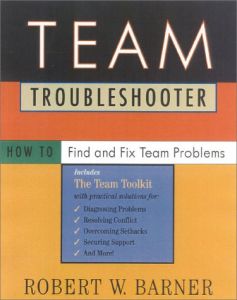Join getAbstract to access the summary!

Join getAbstract to access the summary!
Robert W. Barner
Team Troubleshooter
How to Find and Fix Team Problems
Davies-Black Publishing, 2001
What's inside?
No teams are perfect, but yours can come closer than they are now.
Recommendation
Robert W. Barner has produced a remarkable resource. Lucid, organized, utterly practical and results-oriented, this cookbook for team builders and members belongs on every organization’s bookshelf. Barner has condensed everything he has learned from two decades of consulting and team-building experience into a five-step process for improving team relationships and performance. He identifies the most common pitfalls for teams, and provides a kit of 51 tools designed for specific team-building or team-repair tasks. Neither abstract nor psychological in nature, this practical workbook describes proven techniques and strategies for quickly and effectively addressing a wide range of problems that frequently occur among teams. Bottom line: getAbstract.com considers this an essential resource for managers, team leaders and team members.
Summary
About the Author
Robert W. Barner, Vice President of Organizational Development and Learning for Choice Hotels International, is a 20-year veteran of international consulting. He has worked with a broad range of clients, including AT&T, Honeywell, GTE and Disney, to strengthen team performance. He is the author of Executive Resource Management, Lifeboat Strategies, and Crossing the Minefield, and his work has appeared in The Futurist, HR Magazine, and Training & Development Journal.

















Comment on this summary